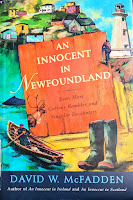An Innocent in Newfoundland by David W. McFadden
As much as I loved the descriptions of places, the heart of this book is in the conversations he has with people he meets in hotels, coffee shops, bars, etc. Connecting seems to be his superpower. He can talk to anyone, anywhere, anytime, always knowing what to say to put people at ease. It's a gift, one I've never possessed but greatly admire in an envious, maybe slightly resentful kind of way.
I've come across a few negative reviews of this book that accuse the author of mocking Newfoundland and Newfoundlanders but it didn't strike me that way at all. He will spell out words here and there to show us how they are pronounced on the island, but I think he's pointing out differences, not making fun. He seems to be genuinely interested in the people and their stories. The impressions I'm left with are of a place of spectacular beauty, and of people who are friendly, generous and open-hearted. I can see a lot of people adding Newfoundland to their travel goals after reading this.
What I love about travel books, other than being immersed in the culture of a place I'd like to visit but can't, is the history, the geography, and all the interesting little things there are to learn about a place. For example, I discovered that Newfoundland's official motto is "Seek Ye First the Kingdom of God." Having lived all my life in Atlantic Canada, and not very far away, I can't believe I didn't know that. It's a good motto!
And I learned about a Newfoundland passenger ferry, traveling between North Sydney, NS and Port aux Basques, Nl, being torpedoed by a German U-boat in 1942. The boat sank and 136 people were killed. That story led me to look up other enemy incursions into Canadian waters and so on, and so on. Every travel book I've ever read has been as much education as entertainment.
So. Entertainment, education, beautiful scenery, great people, a witty narrator - what more could you want? Definitely read this one.









